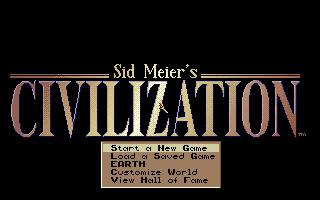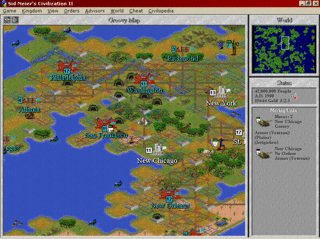The Golden Age of gaming really was experienced for the most part on the Commodore 64 in the mid 80’s to early 90’s in my opinion. That’s not to say it ended there but without sounding like a Commodore 64 Yuppie, it was during those early days of computer gaming that both game design and gameplay was at its purest form.
I’m sure not everyone would agree, but hear me out. For starters during the Commodore 64 days game designers had to deal with extremely limited resources, which meant that creativity and focus on gameplay was essential to have a successful game. Things like graphics, sound and music were additions made after the kinks of the actual game were worked out. As the industry progressed, giving way to more and better resources you would think game designers would take advantage of those resources by expanding their game design. What happened instead was that the resources were traded in for better graphics, sound effects and music and did little to progress game design forward with a few exceptions of course. I believe the only way to have a successful game is to focus solely on game design, everything else is just a bonus. The Golden Age began to decline when this ideology slipped from the minds of game developers and ended when words like eye candy and franchise rights were added to the mix. It was a bitter sweet time in the early 90’s because despite the fact that the technology was becoming far superior to commodore 64, the games that were released for these seemingly better machines were not.
When the commodore 64 lost favor for bigger and better machines like the IBM PC, the great golden age of gaming began to slip right through the finger tips of the game developers, who had already turned computer gaming into a legitimate business. Sadly the game industry would remain in a more or less infancy for many years for this very reason in my opinion and were it not for a few game designers that lived through and remembered the golden age of gaming, it would probably still be struggling today. Yes, the golden age of gaming was on a decline by the early 90’s but it was hardly over.
 One of several great game designers of the early days of gaming was Sid Meier who by the early 90’s had already contributed a golden age classic called pirates to the gaming industry. Quite frankly, Sid could have grabbed his chest, keeled over and died right then and there and he would be no less famous today then he is right now, that’s how good Pirates really was. Pirates however wasn’t to be his greatest contribution, far from it, another title would take that honor and would in many ways revitalize the declining golden age of gaming, in fact almost starting a new golden age in its own right. Civilization was the name and global domination was the game.
One of several great game designers of the early days of gaming was Sid Meier who by the early 90’s had already contributed a golden age classic called pirates to the gaming industry. Quite frankly, Sid could have grabbed his chest, keeled over and died right then and there and he would be no less famous today then he is right now, that’s how good Pirates really was. Pirates however wasn’t to be his greatest contribution, far from it, another title would take that honor and would in many ways revitalize the declining golden age of gaming, in fact almost starting a new golden age in its own right. Civilization was the name and global domination was the game. Civilization was released for the Amiga and PC initially, having been too advanced for machines from earlier eras in 1991. It would be the first of over 20 variations of the game released on almost every machine capable of running games between 1991 to today. Infinitely popular and awesomely designed Civilization was in its own way a gaming phenomenon that would sweep through and capture the imagination of gamers and non gamers alike. In my opinion it’s a special game because it broke the nerd barrier that prevented anyone who didn’t want to be a nerd from playing, in fact it became kind of cool to play civilization because it was actually an educational game to some degree. To hardcore gamers like me however it was far more then just some trend, Civilization was the single best game ever released at the time and to many players out there holds that title to this very day.
Civilization was released for the Amiga and PC initially, having been too advanced for machines from earlier eras in 1991. It would be the first of over 20 variations of the game released on almost every machine capable of running games between 1991 to today. Infinitely popular and awesomely designed Civilization was in its own way a gaming phenomenon that would sweep through and capture the imagination of gamers and non gamers alike. In my opinion it’s a special game because it broke the nerd barrier that prevented anyone who didn’t want to be a nerd from playing, in fact it became kind of cool to play civilization because it was actually an educational game to some degree. To hardcore gamers like me however it was far more then just some trend, Civilization was the single best game ever released at the time and to many players out there holds that title to this very day.What was it that separated Civilization from the pack? Purely and simply, game design. There
 could be no easier answer and for those of us who followed gaming at the time and now, at that very moment in time there was nothing that came even remotely close to the game design level Civilization was at. In fact, with the exception of the Civilization sequels even today there are very few games that play at the level of intelligence and strategy as do the Civilization series games.
could be no easier answer and for those of us who followed gaming at the time and now, at that very moment in time there was nothing that came even remotely close to the game design level Civilization was at. In fact, with the exception of the Civilization sequels even today there are very few games that play at the level of intelligence and strategy as do the Civilization series games.The games design is brilliant because Sid took every aspect of a global domination game and included it using not realistic historical data, but common sense data, things that we all sort of already know. This classic design genius is what makes most of Sid Meiers game designs so great, he understands that popular culture and not reality rule the gaming world. It makes games like Civilization approachable because it doesn’t demand too much knowledge from us, while at the same time demanding that you think when you play. Sid also understood that different people will play his game in different ways and the option to do just that is a critical part of all of Sid Meier games success.
 Science, Military, Diplomacy, Economics and Domestic affairs are just some of the things you had to manage as a leader of a nation among many. Competing for the ultimate prize, the planet, in on itself that alone had the makings of a great game. In fact most game designers would probably have stopped right there and then. Sid however had the foresight to know that there was far more possible with a game like that. Randomized maps with a variety of starting conditions that would create endless replay-ability was unheard of at the time, at least at this level of complexity. Multiple ways to win including the lovable space race which could allow you to win the game even if you were loosing the global war. The game had so many possibilities you would have to play it at least a thousand times to see them all and even then there was no assurance that you had.
Science, Military, Diplomacy, Economics and Domestic affairs are just some of the things you had to manage as a leader of a nation among many. Competing for the ultimate prize, the planet, in on itself that alone had the makings of a great game. In fact most game designers would probably have stopped right there and then. Sid however had the foresight to know that there was far more possible with a game like that. Randomized maps with a variety of starting conditions that would create endless replay-ability was unheard of at the time, at least at this level of complexity. Multiple ways to win including the lovable space race which could allow you to win the game even if you were loosing the global war. The game had so many possibilities you would have to play it at least a thousand times to see them all and even then there was no assurance that you had.I could go on and on about the game, but I think it should suffice to say that its lovable complexity and approachable gameplay made Civilization the ageless classic that it is. Easily one of the greatest games of it’s time and perhaps the last game to be released that had a global impact on the gaming industry during the golden age of gaming.
Civilization defined the turned based strategy games genre but more importantly it created a standard for strategy games that designers continue to this very day to match. Thank god it did! Civilization gave way to other turned based strategy gems that furthered the genre and of all the games post Civilization there was none that captured my attention more then the Golden Age Classic Master of Orion. In many ways Master Of Orion would create a whole new genre of gaming itself despite belonging to the turned based strategy games genre, but more importantly Master Of Orion would prevent the golden age of gaming from ending prematurely.
No comments:
Post a Comment